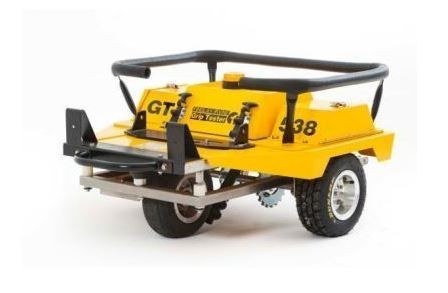


In 2016 loss-of-control accounted for 40% of all fatal car crashes in New Zealand. When it comes to road maintenance, skid resistance matters.
Road Science was approached by Waipa District Council (Waipa) to carry out skid resistance testing on their sealed road network. They wished to investigate accident hot spots in the area as well as establish an annual monitoring program of their main arterial routes. Waipa DC had been looking for a friction testing provider for several years but had been unsuccessful due to a lack of contractors providing this service.
The GripTester MK2 by Road Science.
The GripTester MK2 stands as the world’s leading trailer-mounted continuous friction measuring device, trusted globally for its reliability and precision. It evaluates surface skid resistance by employing a specially designed measuring wheel that operates with controlled slip in comparison to the two main drive tyres. This wheel is continuously braked, and both the load and drag forces acting upon it are meticulously recorded. These measurements are used to calculate a highly accurate friction coefficient, which is transmitted in real time to a data acquisition system. Results are expressed as a Grip Number, a standardised metric that directly correlates with the Sideways-Force Coefficient (SFC), allowing for seamless integration with international friction measurement benchmarks.

In October 2023, the Road Science team surveyed approximately 124 lane km’s of major arterial routes and localised accident hot spots around Cambridge and Te Awamutu. Data collection was completed over a three-day period without the need for any onsite traffic management. This timeframe is comparable with that of the SCRIM truck, whilst a similar test program with a British Pendulum would be totally impractical from an efficiency perspective.
Processing and reporting of results were completed over the subsequent fortnight. Results for all surveys were reported in both Grip Number and Sideways Force Coefficient (SCRIM). SCRIM results were reported against the skid resistance Investigatory Levels (IL) and Threshold Levels (TL) as set out in NZTA T10 Specification for state highway skid resistance management. Results were reported in 1m intervals for accident hot spots to gain a high-resolution insight into these dangerous sections. Major arterial routes were reported in 10m intervals to allow for easy annual monitoring of full-length roads. All SCRIM results were conditionally formatted against IL and TL to allow for instant recognition of failing sections.



“I was very happy with the service Road Science provided – from first contact to discuss our needs through to undertaking the testing.
Good information was provided so I could decide on the best level of data collection to inform us of issues, as efficiently as possible.
While the testing was well done and data provided promptly – I was super impressed with the effort that Road Science took to present that data in a practically useful form: charts that clearly plotted exceptions so that our maintenance crew can easily manually inspect, and act on the problem areas.
Despite only having a small package of targeted, local road work I was treated as a valuable customer and all effort was made to deliver the information I was seeking. “
Jason O'Dea – Transportation Safety Engineer, Waipa District Council